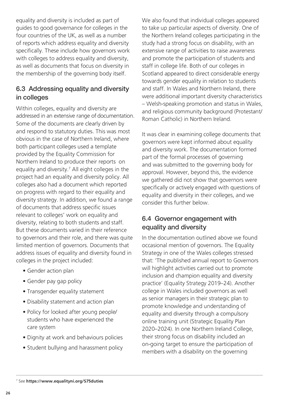
26
equality and diversity is included as part of
guides to good governance for colleges in the
four countries of the UK, as well as a number
of reports which address equality and diversity
specifically. These include how governors work
with colleges to address equality and diversity,
as well as documents that focus on diversity in
the membership of the governing body itself.
6.3��Addressing�equality�and�diversity
in colleges
Within colleges, equality and diversity are
addressed in an extensive range of documentation.
Some of the documents are clearly driven by
and respond to statutory duties. This was most
obvious in the case of Northern Ireland, where
both participant colleges used a template
provided by the Equality Commission for
Northern Ireland to produce their reports on
equality and diversity.7 All eight colleges in the
project had an equality and diversity policy. All
colleges also had a document which reported
on progress with regard to their equality and
diversity strategy. In addition, we found a range
of documents that address specific issues
relevant to colleges' work on equality and
diversity, relating to both students and staff.
But these documents varied in their reference
to governors and their role, and there was quite
limited mention of governors. Documents that
address issues of equality and diversity found in
colleges in the project included:
• Gender action plan
• Gender pay gap policy
• Transgender equality statement
• Disability statement and action plan
• Policy for looked after young people/
students who have experienced the
care system
• Dignity at work and behaviours policies
• Student bullying and harassment policy
We also found that individual colleges appeared
to take up particular aspects of diversity. One of
the Northern Ireland colleges participating in the
study had a strong focus on disability, with an
extensive range of activities to raise awareness
and promote the participation of students and
staff in college life. Both of our colleges in
Scotland appeared to direct considerable energy
towards gender equality in relation to students
and staff. In Wales and Northern Ireland, there
were additional important diversity characteristics
- Welsh-speaking promotion and status in Wales,
and religious community background (Protestant/
Roman Catholic) in Northern Ireland.
It was clear in examining college documents that
governors were kept informed about equality
and diversity work. The documentation formed
part of the formal processes of governing
and was submitted to the governing body for
approval. However, beyond this, the evidence
we gathered did not show that governors were
specifically or actively engaged with questions of
equality and diversity in their colleges, and we
consider this further below.
6.4��Governor�engagement�with�
equality�and�diversity
In the documentation outlined above we found
occasional mention of governors. The Equality
Strategy in one of the Wales colleges stressed
that: 'The published annual report to Governors
will highlight activities carried out to promote
inclusion and champion equality and diversity
practice' (Equality Strategy 2019-24). Another
college in Wales included governors as well
as senior managers in their strategic plan to
promote knowledge and understanding of
equality and diversity through a compulsory
online training unit (Strategic Equality Plan
2020-2024). In one Northern Ireland College,
their strong focus on disability included an
on-going target to ensure the participation of
members with a disability on the governing
7 See https://www.equalityni.org/S75duties